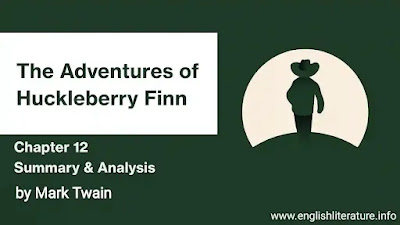Also Read
SUMMARY
Huck hopes to be able to fool the men, who were supposed to come to the island looking for them, with the remnants of the campfire that he had built. The next morning, at day-break, the two of them start discussing the possible modus operandi that the villagers must have resorted to, in their search for them. Jim comments that the lady, Mrs. Judith Loftus seemed to be a smart one by the way she could make things out. He is certain that she must have made her husband take the help of sniffer dogs to hunt out the two boys. But Huck doesn't care about all that as long as they are safe.
Jim uses some planks to build a shed on the raft, so as to shield them from the blazing sun and the rain. After a gloomy voyage for five night finally they come to the beautifully lit town of St. Louis. The two of them live on food that is either bought or stolen. Occasionally, they feel remorseful and decide to relinquish some of the food as penitence. All in all, they 'lived pretty high'
One night, there is a severe storm. They come across a wrecked steamboat. Beckoned by his inherent fondness for adventure, against Jim's wishes, Huck decides to go closer and take a look. Moreover, there is the prospect of finding some cash or stuff that may come in handy. After exploring it for some time, just as they are about to leave, they hear sounds of a heated argument. Tempted to discover the source or the commotion, Huck overhears two robbers talking about killing a third one, lest he betrays them. They overhear their comrade pleading with them to leave him and promises not to betray them. Jim advises him against the potential risk of exploring more about the robber but Huck wouldn't budge. He feels enticed to satiate his curiosity and, therefore, decides to stay. So close to being detected, Huck feels sorry that he ever decided to stay. Instead of killing their companion, the two men decide to let him be drowned along with the wrecked boat. Huck plans to set the robbers' boat loose so that they can't escape, unaware of the fact that their own raft has broken loose and floated away.
CRITICAL ANALYSIS
By helping the two boys break away from the world that they despise, the raft symbolizes a retreat for them. It offers them the safety that they need so badly. It serves to foster a close bond between them - a bond that would stand the test of time, throughout the novel.
Huck and Jim "lift" chickens and "borrow" watermelons, etc. But fundamentally, the lucid undertone is that they steal these things. They resort to rationalizing their deeds by relinquishing some of these items. By using the word "borrow", the deed sounds less offensive. Here again, Mark Twain seems to be poking fun at the codes of Christian morality, in that, one tends to downsize misconduct by lending it a veneer of integrity.
Another instance, when Twain derides the concept of religious conviction and principles, is through what transpires between the two robbers. They talk of "good morals" and decide against killing their cohort. They decide to leave him tied to the wrecked and sinking boat. Their decision is not because they respect the tenets of religiosity, but because they don't want to carry the burden of sin.
Tom Sawyer has always been Huck's role model. The latter would go to any lengths to emulate Tom. Who would "land on that wreck if it was his last act" and would "throw style into it". "Why, you'd think it was Christopher Columbus discovering Kingdom-Come. I wish Tom Sawyer was here". Equating Tom to Christopher Columbus, Huck reveals how strongly he idealizes his friend. During the wrecked steamboat episode, Huck refuses to go with Jim because "Tom sawyer Wouldn't back out now, and so I won't either.... This episode serves as yet another reminder that Huck's desire to act "like Tom Sawyer" can land him up in trouble. Going by his own instincts, which are more mature, is surely a better idea. As we would see later in the novel, when Tom and Huck work towards helping Jim attain freedom, Tom's inclination towards doing things as per his adventure books lands then in considerable trouble.
The steamboat, named "Walter Scott, seems to be an allusion to Sir Walter Scott, 19th century novelist and author of romantic novels like Ivanhoe. Mark Twain often passed derisive remarks on the romantic ideals depicted by such novels, as these ideals, according to Twain, are completely divorced from reality. Twain himself was a realist and endorsed views that added veracity to the scheme of things. He was a staunch follower of reality and regarded romanticism as having a corrupting influence on the rationality of the mind.
